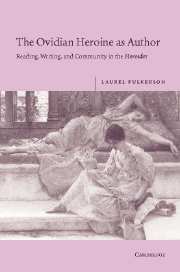Book contents
- Frontmatter
- Contents
- Acknowledgments
- List of abbreviations
- Introduction
- 1 Reading dangerously: Phyllis, Dido, Ariadne, and Medea
- 2 Reading the future?: Hypsipyle, Medea, and Oenone
- 3 Benefits of communal writing: Canace and Hypermestra
- 4 A feminine reading of epic: Briseis and Hermione
- 5 Reading magically: Deianira and Laodamia
- 6 Reading like a virgin: Phaedra and Ariadne
- 7 Caveat lector: thoughts on gender and power
- Appendix: The authenticity (and “authenticity”) of Heroides 15
- Bibliography
- Index
- Index Locorum
6 - Reading like a virgin: Phaedra and Ariadne
Published online by Cambridge University Press: 22 September 2009
- Frontmatter
- Contents
- Acknowledgments
- List of abbreviations
- Introduction
- 1 Reading dangerously: Phyllis, Dido, Ariadne, and Medea
- 2 Reading the future?: Hypsipyle, Medea, and Oenone
- 3 Benefits of communal writing: Canace and Hypermestra
- 4 A feminine reading of epic: Briseis and Hermione
- 5 Reading magically: Deianira and Laodamia
- 6 Reading like a virgin: Phaedra and Ariadne
- 7 Caveat lector: thoughts on gender and power
- Appendix: The authenticity (and “authenticity”) of Heroides 15
- Bibliography
- Index
- Index Locorum
Summary
“Alors elle se rappela les héroïnes des livres qu'elle avait lu, et la légion lyrique de ces femmes adultères se mit à chanter dans sa mémoire avec des voix de soeurs qui la charmaient. Elle devenait elle-même comme une partie véritable de ces imaginations et réalisait la longue rêverie de sa jeunesse, en se considérant dans ce type d'amoureuse qu'elle avait tant envié.”
(Flaubert, Madame Bovary)Through a discussion of the ways the women of Phaedra's family affect her view of the world, this chapter examines Phaedra's relationship to her stepson Hippolytus and to her husband Theseus. Like Phyllis in Chapter 1, Phaedra looks to a woman whose story is similar to her own, and bases her assessment of similarity on genetic relationship (in both cases, to Ariadne). In Phyllis' case, the family connection is only potential, but Ariadne is Phaedra's sister, and her story has formed an indelible impression on Phaedra, especially given that both women have a relationship with Theseus in common. At the same time, to most readers, the stories of Ariadne and Theseus and of Phaedra and Hippolytus share few similarities. Yet, as we shall see, Phaedra alters her own story to fit into the mold of Ariadne, and also borrows key details from her mother Pasiphae's story.
Ariadne's authority does not stop here, for she is also a powerful influence on other women of the Heroides; in fact Heroides 10 explicitly establishes her text as authoritative in matters of abandonment.
- Type
- Chapter
- Information
- The Ovidian Heroine as AuthorReading, Writing, and Community in the Heroides, pp. 122 - 142Publisher: Cambridge University PressPrint publication year: 2005



